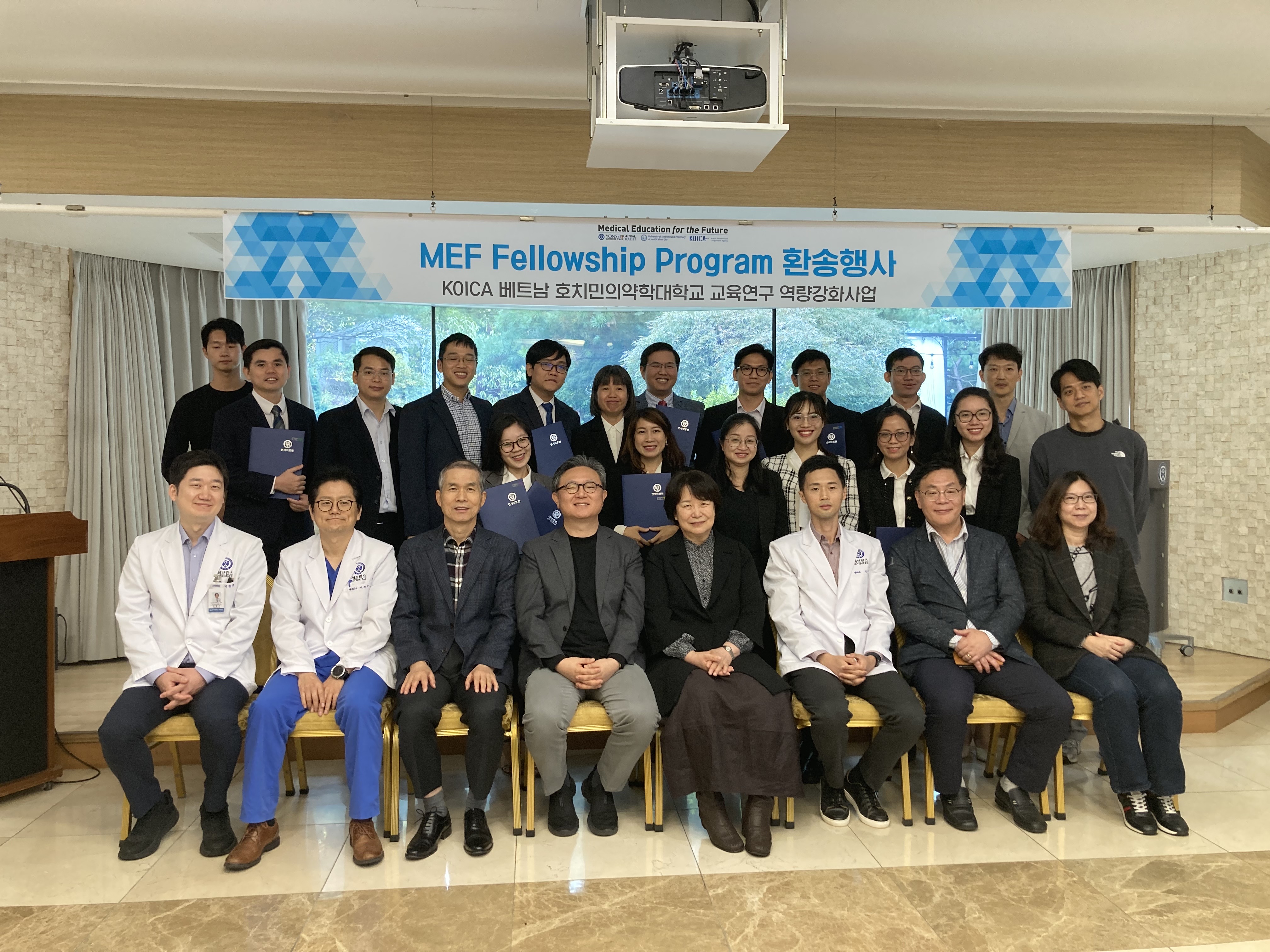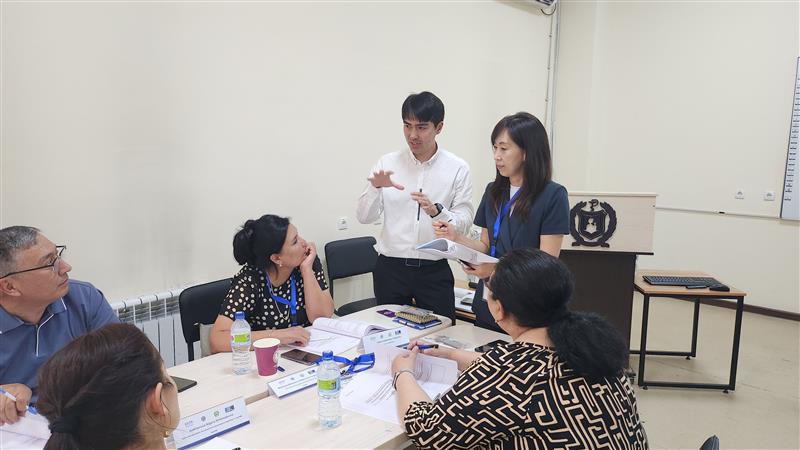Activities & News
News & Events
[gMed] Medical Center Nurtures Future Medical Professionals in Vietnam and Uzbekistan
- Views 289
- Writer 제중원보건개발원
- Date 25.01.02

의료원, 베트남 우즈벡 미래 의료인 키운다
국제의학교육개발사업단, 역량강화 사업 장기 프로젝트 순항
제중원보건개발원 산하 국제의학교육개발사업단이 베트남과 우즈베키스탄의 미래 의료인 양성을 위해 팔을 걷었다.
국제의학교육개발사업단(gMED)은 한국국제협력단(KOICA)이 발주한 신남방‧신북방 고등교육 혁신사업의 사업책임자로 현재 베트남 호치민의약학대학 교육연구 역량강화 사업 MEF와 우즈베키스탄 타슈켄트 소아의과대학교 교육연구 역량강화 사업 MNEF를 수행하고 있다.
국제의학교육개발사업단은 베트남에서는 2021년, 우즈베키스탄에서는 2022년 각각 111억원과 56억원의 지원비로 사업을 시작해 현재는 프로젝트 중간 단계에 이르렀다.
두 프로젝트는 최대 5년간 현지 학교의 의과대학생뿐만 아니라 전공의, 세부전문의도 교육대상으로 삼는다.
베트남 MEF 사업은 의학교육, 임상수련, 연구역량, 산학협력 총 4가지 분과로 나눠 진행 중이다. 의학교육 미디어 스튜디오를 준공해 온라인 교육자료를 개발하며 자기주도적 교육 환경 개선에 힘썼다. 또 졸업시험 문항 900개와 교육과정을 마친 40명의 교수 양성을 목표로 졸업시험 문항과 교육자료 개발에도 힘을 모았다. 베트남 전공의와 세부 전문의 트레이닝을 위한 ‘Twinning program’도 실시했다. 대상 전공은 내과학, 외과학, 산부인과학, 소아과학, 감염내과학 등 11개 과다. 교수 등 연구원 초청연수를 실시하고 의과대학 학술지 멘토링도 이어져 연구와 논문작성에 대한 이해도를 높였다. 디지털의료, AI 등 의학과 산업이 시너지를 낼 수 있는 공동연구 참여도 독려했다.
 우즈베키스탄 간호교육
우즈베키스탄 간호교육
우즈베키스탄 MNEF 사업은 의학교육, 간호교육, 연구역량, 산학협력분과로 구성됐다. 간호교육 공동연구 온라인 워크숍을 통해 문제중심학습, 팀기반학습 등 교수학습법과 실습지도자 매뉴얼 개발에 대한 지식 교류와 네트워킹을 강화했다. 산학협력워크숍을 통해서는 산학협력 가능성이 있는 연구팀을 선발해 각 팀의 발표를 듣고 심사 평가를 거쳐 연구 결과에 대한 사업화 과정을 도왔다.
안신기 국제의학교육개발사업단장은 “의료원이 가진 의학, 간호학 교육 및 연구역량과 사업화 경험을 통해 베트남과 우즈베키스탄 미래 의료진 양성을 도와 세계 보건 수준 향상에 지속적으로 기여할 것”이라고 말했다.
Global Medical Education Development Working Group, Long-term Projects Progressing
The Global Medical Education Development Working Group(gMed), under the Yonsei Institute for Global Health, has embarked on a mission to cultivate future medical professionals in Vietnam and Uzbekistan. Acting as the project lead for the New Southern and New Northern Policy higher education innovation initiatives commissioned by the Korea International Cooperation Agency (KOICA), gMed is currently advancing Medical Educatiuon for the Future Project (MEF) in Vietnam and Medical & Nursing Education for the Future Project (MNEF) in Uzbekistan.
Launched in 2021 with a budget of 9.68 million USD in Vietnam and in 2022 with 5 million USD in Uzbekistan, these initiatives have reached their mid-point. The projects aim to train not only medical students but also residents and subspecialists over a span of up to five years.
The MEF project in Vietnam is divided into four key areas: medical education, clinical training, research capacity, and industry-academia collaboration. The project has seen the establishment of a medical education media studio to develop online educational materials, fostering a self-directed learning environment. Efforts have also focused on developing 900 graduation exam questions and training 40 professors in curriculum development. The program has introduced a "Twinning Program" for residents and subspecialists in 11 fields, including internal medicine, surgery, obstetrics and gynecology, pediatrics, and infectious diseases. Additionally, researchers and faculty were invited for training, and mentoring for medical journal publication was provided to enhance understanding of research and academic writing. Collaborative research in digital medicine, AI, and other interdisciplinary areas has been actively encouraged.
The MNEF project in Uzbekistan comprises medical education, nursing education, research capacity, and industry-academia collaboration. Online workshops have been held on nursing education, covering topics such as problem-based learning and team-based learning, along with developing manuals for clinical practice guidance. Industry-academia collaboration workshops identified promising research teams and supported the commercialization of their findings through evaluation and guidance.
Prof. Shin-Ki An, head of the Global medical Education Development Working Group, stated, "By leveraging our medical and nursing education expertise, research capabilities, and commercialization experience, we aim to contribute to improving global healthcare standards by supporting the development of future medical professionals in Vietnam and Uzbekistan."
"If file name is long, file name can be cut due to browser characteristics."



